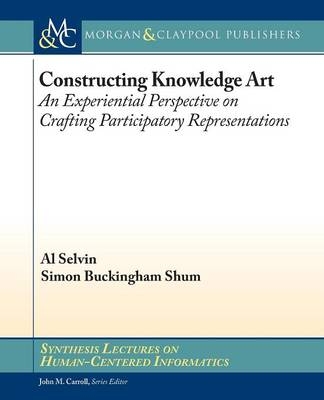
Constructing Knowledge Art
An Experiential Perspective on Crafting Participatory Representations
Seiten
2014
Morgan and Claypool Life Sciences (Verlag)
978-1-62705-259-7 (ISBN)
Morgan and Claypool Life Sciences (Verlag)
978-1-62705-259-7 (ISBN)
Examines what moves and choices practitioners make that either help or hinder participants’ engagement with representations. This volume presents a theoretical framework that looks at these choices from the experiential perspectives of narrative, aesthetics, ethics, sensemaking and improvisation and applies it to five diverse case studies of actual practice.
This book is about how people (we refer to them as practitioners) can help guide participants in creating representations of issues or ideas, such as collaborative diagrams, especially in the context of Participatory Design (PD). At its best, such representations can reach a very high level of expressiveness and usefulness, an ideal we refer to as Knowledge Art. Achieving that level requires effective engagement, often aided by facilitators or other practitioners. Most PD research focuses on tools and methods, or on participant experience. The next source of advantage is to better illuminate the role of practitioners-the people working with participants, tools, and methods in service of a project’s larger goals. Just like participants, practitioners experience challenges, interactions, and setbacks, and come up with creative ways to address them while maintaining their stance of service to participants and stakeholders. Our research interest is in understanding what moves and choices practitioners make that either help or hinder participants’ engagement with representations. We present a theoretical framework that looks at these choices from the experiential perspectives of narrative, aesthetics, ethics, sensemaking and improvisation and apply it to five diverse case studies of actual practice.
This book is about how people (we refer to them as practitioners) can help guide participants in creating representations of issues or ideas, such as collaborative diagrams, especially in the context of Participatory Design (PD). At its best, such representations can reach a very high level of expressiveness and usefulness, an ideal we refer to as Knowledge Art. Achieving that level requires effective engagement, often aided by facilitators or other practitioners. Most PD research focuses on tools and methods, or on participant experience. The next source of advantage is to better illuminate the role of practitioners-the people working with participants, tools, and methods in service of a project’s larger goals. Just like participants, practitioners experience challenges, interactions, and setbacks, and come up with creative ways to address them while maintaining their stance of service to participants and stakeholders. Our research interest is in understanding what moves and choices practitioners make that either help or hinder participants’ engagement with representations. We present a theoretical framework that looks at these choices from the experiential perspectives of narrative, aesthetics, ethics, sensemaking and improvisation and apply it to five diverse case studies of actual practice.
Verizon Communications and University of Technology Sydney, Australia
Acknowledgments
Introduction
Participatory Design and Representational Practice
Dimensions of Knowledge Art
Case Studies
Discussion and Conclusions
Appendix: Knowledge Art Analytics
Bibliography
Author Biographies
| Erscheint lt. Verlag | 30.10.2014 |
|---|---|
| Reihe/Serie | Synthesis Lectures on Human-Centered Informatics |
| Verlagsort | San Rafael, CA |
| Sprache | englisch |
| Maße | 191 x 235 mm |
| Gewicht | 238 g |
| Themenwelt | Informatik ► Software Entwicklung ► User Interfaces (HCI) |
| ISBN-10 | 1-62705-259-3 / 1627052593 |
| ISBN-13 | 978-1-62705-259-7 / 9781627052597 |
| Zustand | Neuware |
| Haben Sie eine Frage zum Produkt? |
Mehr entdecken
aus dem Bereich
aus dem Bereich
Aus- und Weiterbildung nach iSAQB-Standard zum Certified Professional …
Buch | Hardcover (2023)
dpunkt Verlag
34,90 €
Lean UX und Design Thinking: Teambasierte Entwicklung …
Buch | Hardcover (2022)
dpunkt (Verlag)
34,90 €
Wissensverarbeitung - Neuronale Netze
Buch | Hardcover (2023)
Carl Hanser (Verlag)
34,99 €


